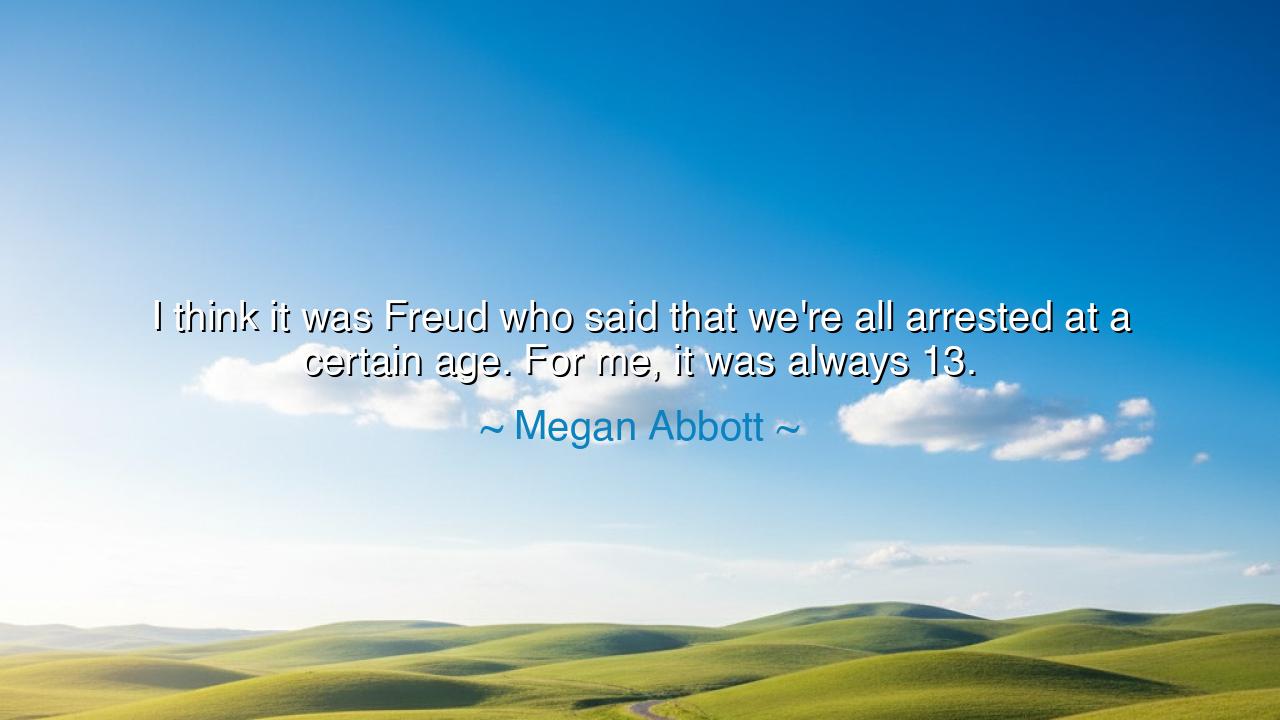
I think it was Freud who said that we're all arrested at a
I think it was Freud who said that we're all arrested at a certain age. For me, it was always 13.






"I think it was Freud who said that we're all arrested at a certain age. For me, it was always 13." These words, spoken by the insightful Megan Abbott, evoke a powerful truth about the human psyche. Freud, the father of modern psychology, once proposed that the development of an individual could become "arrested" at a particular age—a stage in life when the emotional and psychological growth halts, leaving an individual emotionally tethered to that moment. For Abbott, that moment, that point of arrest, was the age of 13. In these words lies a reflection on the unyielding grip of youth, and the struggle of carrying the weight of adolescence into the adult world.
At 13, the world is both a wonder and a mystery. It is a time of transformation, when one stands on the precipice of adulthood, yet still clings to the innocence of childhood. The mind is alive with questions, emotions, and dreams, but it is also shaped by the confusion and turbulence of self-discovery. For Abbott, this age symbolizes a moment of truth, a time when her identity was forged in the fires of confusion, longing, and hope. She claims that this pivotal moment, when her growth could have advanced, was instead frozen in time, allowing her to live with the emotional and psychological echoes of adolescence throughout her life.
Consider the case of Albert Einstein, whose intellectual growth began at a very young age. Though widely celebrated for his achievements as an adult, Einstein spoke often of his early curiosities, particularly his fascination with the idea of the compass, which ignited his lifelong pursuit of knowledge. Yet, even he acknowledged that certain ideas or feelings from his youth remained with him—suspended in time, timeless in their power. Similarly, Abbott reflects on how the age of 13—those formative years—remain etched in her mind, creating a deeply personal connection to the past that shapes the person she is today.
In the same way that youthful experiences can arrest us at a particular age, so too can trauma or profound emotional moments. Consider the story of Vincent van Gogh, whose early years were marked by hardship and isolation, yet his artistry remained bound to the raw emotions of his youth. His paintings reflect a mind forever marked by his personal struggles—each brushstroke an echo of his unyielding emotional connection to the world around him. Like Van Gogh, Abbott suggests that certain ages—especially those filled with change and struggle—remain with us forever, arresting us in a particular psychological state, and leaving us to carry the weight of that time throughout our lives.
This notion of emotional arrest compels us to ask: what is it about our formative years that imprints so deeply upon us? Why do certain moments—whether joyous or traumatic—carry such lasting power? The answer lies in the unresolved conflicts, the dreams, and the desires of our youth. These experiences leave us marked, sometimes forever, as they shape the way we perceive the world. The lesson here is not about trying to escape those moments, but about acknowledging their profound effect on us. To move forward, we must understand how these pivotal moments of our youth have defined who we are, and use that understanding to grow beyond them.
In practical terms, the challenge is clear: we must learn to accept and integrate the parts of ourselves that have been arrested in time. It is only when we truly understand the emotional and psychological imprints of our youth that we can begin to live fully in the present, rather than being trapped in an emotional state that no longer serves us. Embrace those moments, however painful or joyous, for they are part of your journey. Recognize that growth is not simply about moving forward, but about bringing the wisdom of the past into the present, and allowing it to shape a future that is authentic and free.
In conclusion, Megan Abbott’s reflection on the age of 13 offers a powerful insight into the psychological arrest we all face at some point in our lives. Whether it is a memory, a trauma, or a dream, we must learn to embrace and understand the moments that freeze us in time. The key to freedom lies not in escaping our past, but in accepting it, and using its lessons to fuel our journey forward.






AAdministratorAdministrator
Welcome, honored guests. Please leave a comment, we will respond soon